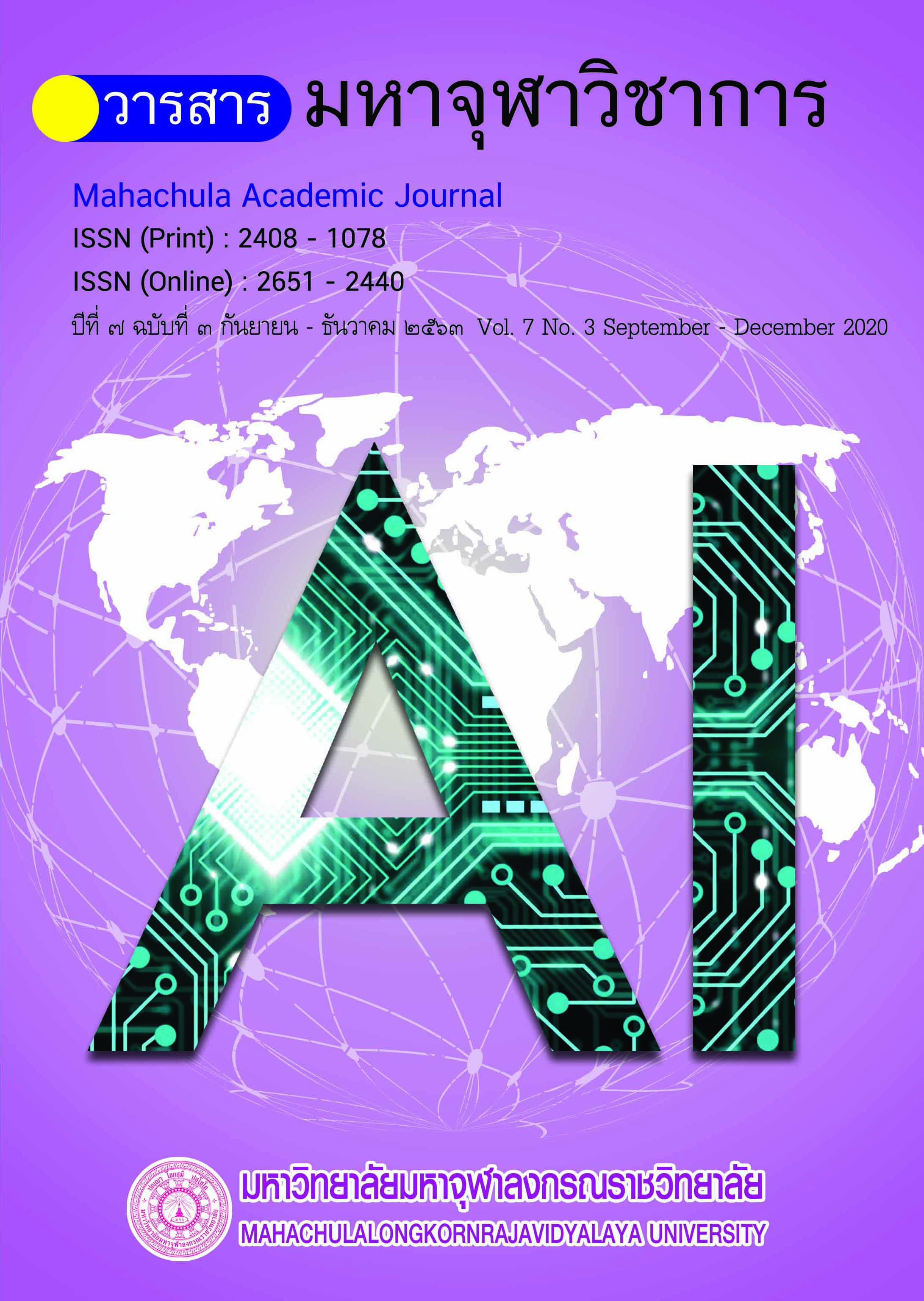The Creation of Sustainable Happiness Based on The Buddhist Integration
Main Article Content
Abstract
This article has three objectives: (1) To study the happiness creation of modern theories. (2) To study the happiness creation of Buddhist philosophy (3) To present the creation of the sustainable happiness model integrated from Buddhist philosophy. This is the qualitative research and field research. The result showed that modern theories aim to the real happiness in concrete accessed by human sense. The happiness is occured from the desire met. The happiness level is related to satisfaction volumn on objects. The happiness based on object is uncertain. Missing the external support, happiness is gone. Buddhist philosophy aims to the real happiness in abstract accessed by spirit. Buddhist philosophy have never denied objects. It is taught to use objects consciously, do not fall into happiness and develop to higher happiness. Happiness level is related to mental development. However, the object development is advanced from the mental development. Therefore, human have feel comfortable but lack of happy heart. With integration of modern theories and Buddhist philosophy to create the sustainable happiness, new model consisted of (1) Goal is the valuable life defined by person and society. (2) Supplies are the virtue suppliers which means consumption with the object’s value for input and life’s value for output. (3) Network is the happiness network which means happiness together and balance of happiness society. (4) Bank is the willpower bank which means meditation for accumulating willpower and spread the willpower to the others.
Article Details
References
มหาจุฬาลงกรณราชวิทยาลัย. พระไตรปิฎกภาษาไทย ฉบับมหาจุฬาลงกรณราชวิทยาลัย เฉลิมพระเกียรติสมเด็จพระนางเจ้าสิริกิติ์ พระบรมราชินีนาถ. กรุงเทพมหานคร: โรงพิมพ์มหาจุฬาลงกรณราชวิทยาลัย, ๒๕๓๙.
คณาจารย์มหาวิทยาลัยมหาจุฬาลงกรณราชวิทยาลัย. มนุษย์กับสังคม. กรุงเทพมหานคร: โรงพิมพ์มหาจุฬาลงกรณราชวิทยาลัย, ๒๕๕๖.
พระพุทธโฆสเถระ. คัมภีร์วิสุทธิมรรค. พิมพ์ครั้งที่ ๑๖. อาจ อาสภมหาเถระ แปลและเรียบเรียง. กรุงเทพมหานคร: บริษัทธนาเพรส จำกัด, ๒๕๕๖.
ราชบัณฑิตยสถาน. พจนานุกรมฉบับราชบัณฑิตยสถาน. กรุงเทพมหานคร: โรงพิมพ์อักษรเจริญทัศน์, ๒๕๒๕.
คงกฤช ไตรยวงศ์. “ความสุขในสังคมประชาธิปไตย”. มติชนสุดสัปดาห์. (๑๕-๒๑ กันยายน ๒๕๖๐): ๑๐.
คิรินันท์ กิตติสุขสถิต. “ความสุขของคนวัยทำงานในองค์กรของประเทศไทย”. วารสารสถาบันวิจัยประชากรและสังคม มหาวิทยาลัยมหิดล. ปีที่ ๓๘ ฉบับที่ ๒ (กุมภาพันธ์ ๒๕๖๑): ๘-๙.
มณเฑียร อรรถวาที. “ความสุขและความทุกข์ในทัศนะของเจรามี เบนธัม”. วารสาร มจร สังคมศาสตร์ปริทรรศน์. ปีที่ ๖ ฉบับที่ ๒ (เมษายน – มิถุนายน ๒๕๕๖): ๑๕-๑๖.
กรมสุขภาพจิต. “เรื่องน่ารู้เกี่ยวกับการฆ่าตัวตาย”. [ออนไลน์]. แหล่งที่มา: https:// www. dmh.go.th/news/ view.asp?id=947 [๑๕ มกราคม ๒๕๖๑].
วิกิพีเดีย สารานุกรมเสรี. จิตวิทยาเชิงบวก. [ออนไลน์]. แหล่งที่มา: http://th.wikipedia.org [๑๙ ธันวาคม ๒๕๖๑].
เสาวลักษม์ กิตติประภัสร์, ดร. ก้าวย่างใหม่ในการพัฒนา: สู่สังคมแห่งความสุข. [ออนไลน์]. แหล่งที่มา: http://www.happysociety.org/uploads/HsoDownload [๑ พฤศจิกายน ๒๕๖๑].
สำนักข่าวบีบีซี. ผลสำรวจพบปี ค.ศ. ๒๐๑๗ โลกเผชิญความเศร้าหมองสูงสุดในรอบกว่าทศวรรษ. [ออนไลน์]. แหล่งที่มา: https://www.bbc.com/thai/international-45533427 [๑ สิงหาคม ๒๕๖๑].
สนทนากลุ่มย่อย: กลุ่มคนรักสุขภาพ, ศูนย์สร้างสุขทุกวัยลุมพินี กรุงเทพมหานคร, ๑๑ ธันวาคม ๒๕๖๑.
สนทนากลุ่มย่อย: กลุ่มคนรักสมาธิ, วัดปทุมวนาราม ราชวรวิหาร กรุงเทพมหานคร, ๙ ธันวาคม ๒๕๖๑.
สนทนากลุ่มย่อย: กลุ่มคนรวมใจอาสา, ศูนย์บริจาคโลหิตแห่งชาติ สภากาชาดไทย , ๒๔ ธันวาคม ๒๕๖๑.
Seligman, M. E. P. Authentic happiness: Using the new positive psychology to realize your potential for lasting fulfillment. New York: Free Press, 2002.


